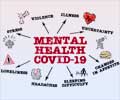Early diagnosis for post-COVID-19 anxiety disorders prevents severe complications later on, genetic tests precisely suggest the right dosage levels of medicine to treat anxiety.

‘Untreated anxiety can lead to complications both mental and physical, genetic tests provide clarity on the right medication levels required to treat anxiety in patients.’





Nearly half of all respondents (46%) rated their anxiety symptoms as moderate to severe in the previous six months, as per the study findings of GeneSight® Mental Health Monitor from Myriad Genetics, Inc. (NASDAQ: MYGN), a leader in genetic testing and precision medicine. The numbers are even worse among those diagnosed with anxiety, with 86 percent rating their anxiety symptoms as moderate to severe in the previous six months. Although the pandemic is only 18 months old, more than half of those who have been diagnosed with anxiety say they have had symptoms for years or decades before seeking help.
Only 36% of those who haven't sought treatment but believe they may be suffering from anxiety intend to do so. When asked what would trigger them to seek help for their anxiety, 47% said a crippling panic attack. Other reasons included a lack of ability to leave their homes (34%), sleep issues (31%), unshakeable sense of dread (30%), and a negative attitude (30%).
COVID-19 Triggered Anxiety Among the Populace
Six in 10 of all respondents said they are concerned with anxiety and/or pandemic-related PTSD. Nearly two-thirds of respondents diagnosed with anxiety said their symptoms have increased "a little or a lot" as a result of the current COVID-19 restrictions.
Advertisement
"It's not a big deal," 35% of all respondents say, while 24% say their problems are "just a phase." Money. 25% say they didn't want to spend the money or that medication resistance is too expensive. 22% say they don't want to go through a medication trial and error process.
Advertisement
In her early twenties, Anna, now 32, was diagnosed with anxiety. Regular medications prescribed by the psychiatrist initially exacerbated her problems, but after she completed the GeneSight test, which analyses how a patient's genes may influence their outcomes, the psychiatrist reduced the dosage by half and it worked.
GeneSight is the category-leading pharmacogenomic test for 61 medications commonly prescribed for depression, anxiety, ADHD, and other psychiatric conditions. The test can help inform clinicians about how anyone specific patient's genes may impact how they metabolize and/or respond to certain psychiatric medications.
Source-Medindia















